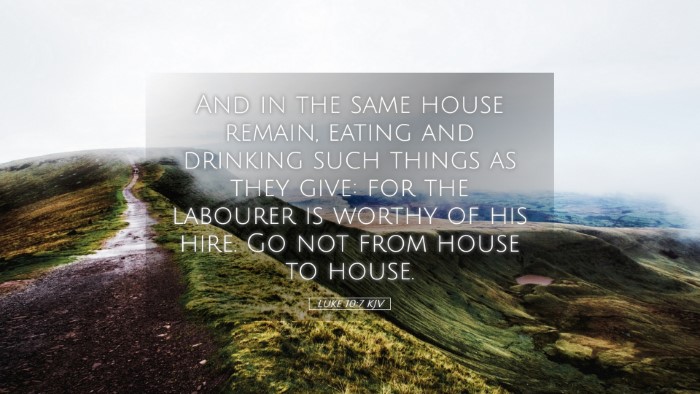Commentary on Luke 10:7
Verse Context:
Luke 10:7 states: "And remain in the same house, eating and drinking what they give you, for the laborer deserves his wages. Do not go from house to house."
The context of this instruction from Jesus comes during the sending out of the seventy-two disciples (or seventy) to proclaim the Kingdom of God. This verse encapsulates Jesus’ guidance on how to conduct themselves during this mission.
Analysis of the Verse
1. The Importance of Stability:
Jesus emphasizes the significance of staying in one house during their ministry. Matthew Henry notes that stability fosters trust and connection with the individuals they serve. By not bouncing from house to house, the disciples cultivate deeper relationships and ensure their message is rooted in the local community.
Adam Clarke adds that remaining in one location allows for more significant ministry opportunities and the chance to share life with the household. This focus contrasts sharply with a mercenary mentality that might lead a minister to chase after material gain or prestige.
2. Eating and Drinking What They Offer:
The disciples are instructed to accept the hospitality extended to them without reservation. Albert Barnes contends that this serves as a model of humility and reliance on God’s providence. The act of accepting sustenance symbolizes acceptance of the ministry’s financial structure, whereby the needs of laborers are met by the generosity of the people they serve.
Clarke further emphasizes that this directive addresses the cultural context of hospitality. It indicates a willingness to share in the life of those they serve, rather than maintaining a distance or an elitist attitude.
3. The Laborer Deserves His Wages:
This phrase captures the essence of the disciples’ work and the legitimacy of their needs being met. Henry remarks that this is a biblical principle rooted in justice. The labors of evangelists, pastors, or anyone spreading the Gospel should be recognized and compensated appropriately for their dedication.
The practice of supporting ministry emerges from the understanding that spiritual work serves the community's interests and should thus be honored and upheld.
Theological Implications
This verse carries weighty theological implications regarding how ministry should be approached and funded. The instruction to remain in one place reflects a broader call to faithfulness in mission work.
Henry observes that it underscores the attitude of the minister—being focused on the work rather than material concerns, trusting that God will provide through those being served. This reliance on God’s provision is vital and encourages semblance of community and support.
Practical Applications
- Building Relationships: The command to stay in one place encourages ministers today to build deeper, more meaningful relationships with their communities.
- Practicing Humility: Accepting hospitality requires humility, which is crucial for effective ministry. Pastors and leaders should model this humility.
- Advocating Fair Compensation: This scripture sets a precedent for fair wages for those who labor in ministry, reminding congregations of their responsibility to support their leaders.
Conclusion
Luke 10:7 is a succinct yet profound directive that frames how discipleship and ministry ought to be conducted. Insights from public domain commentaries enhance our understanding, revealing layers of meaning applicable to modern ministry. Pastors, theologians, and scholars alike can draw from these insights to foster resilient community engagements, advocate for fair support of ministry, and embrace the spirit of receiving and giving in the pursuit of the Gospel.


